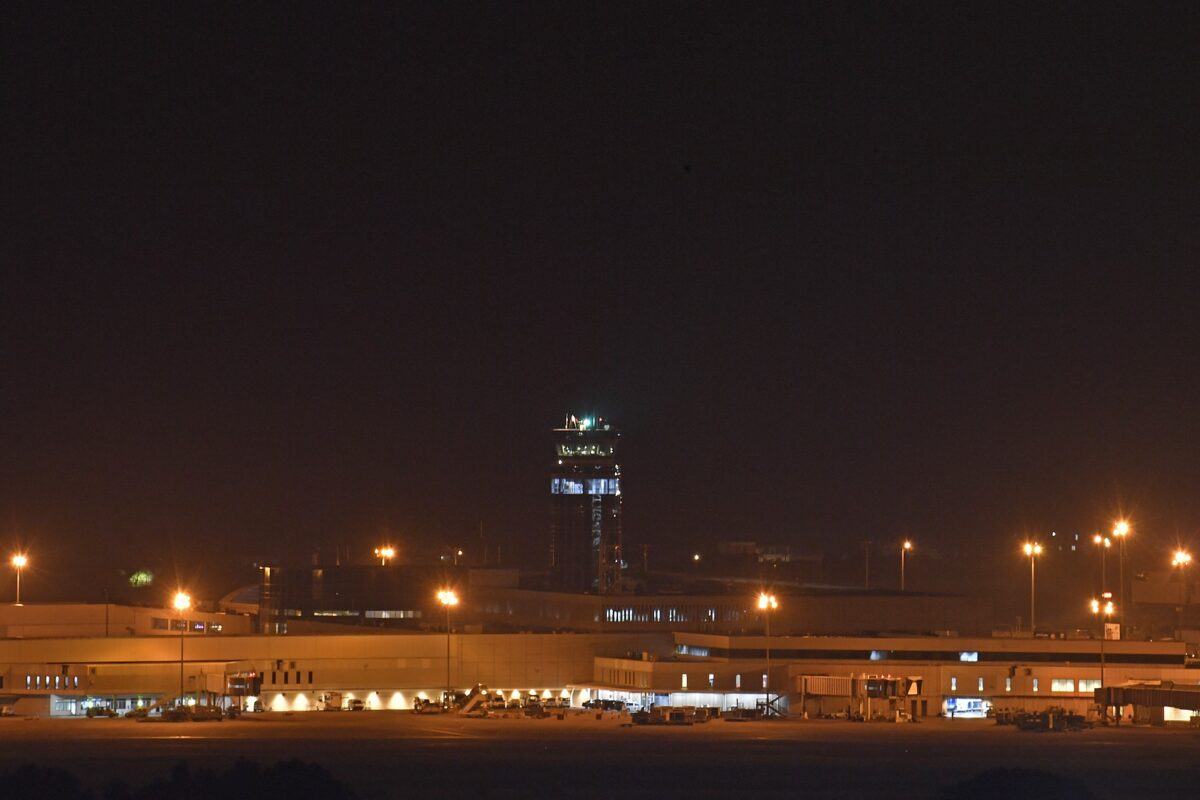
Telecommunication dilemma: caught between GPS spoofing and sluggish internet speeds as political junta and ISPs thwart the introduction of Starlink services.
The long-awaited Iranian retaliation against Israel has weighed on internet connections, as GPS spoofing originating from Israel has become the norm. Israel is violating Article 45 of the ITU by interfering with Lebanon’s and neighboring countries’ GPS and communications signals and frequencies. In August 2022, the ITU issued a warning to member states regarding intentional interferences with GPS and all other communication signals.
Caught between a rock and a hard place, there are fears that the ongoing conflict will also impact internet speeds and raise privacy concerns. Although Lebanon has a high international capacity coming in through underwater fiber optic cables—to the tune of several hundreds of megabits per second (Mbit/s)—internet speeds at the user level are overwhelmingly low. In Beirut, they average about 3.2 Mbit/s according to the Ookla Net Index for household downloads. This is not considered broadband by modern definitions and pales in comparison to the global average of 22.3 Mbit/s.
GPS Spoofing
According to Telecom Engineer Salloum Dahdah, “you cannot do anything in a spoofing situation.” Lebanon lacks the proper technology to counter that. GPS, the US-developed GNSS system, is the most prevalent worldwide; a handful of systems developed by other nations are also in use.
Reports indicate that GPS spoofing has been happening since October last year. It even caused two airplanes to turn back and return to Turkey. Today, planes approaching Lebanon use different location services than their autopilot sources in the industry say. The authoritative site gpsjam.org shows an increased level of 10 percent spoofing here. Israel is using jamming and spoofing technologies to confuse GPS and telecommunications signals as part of its war strategy, a report by the authoritative internet watchdog SMEX says. GPS spoofing was also reported in the region, originating from unknown transmitters around the Iran-Iraq border and the Lebanese-Israeli border, detected by the United States Maritime Administration. GPS spoofing in Lebanon was also reported by organizations tracking its airspace. OPSGROUP and OLBB FIR (Lebanon’s flight information service) reported several cases of critical navigation failures on aircraft that departed from Tel Aviv and were led to fly toward Lebanon.
Locally, GPS spoofing has caused many problems for setting up locations through mobiles, and delivery companies’ workers are struggling to deliver goods and services. It is worth noting that GPS spoofing is seen as advantageous to political groups, as many militia leaders were targeted using their location through their mobiles.
“Many bombs, drones, and other weapons use GNSS [global navigation satellite systems] for guidance these days, which makes them much more accurate and easier to manufacture than trying to build accurate INS [inertial navigation systems],” experts at OGERO local telecom authority say. “So, interfering with GNSS signals is seen as a prudent defensive move,” they believe. Unfortunately, OGERO lacks those instruments,.
Experts agree that, especially when it comes to the proliferation of unmanned aerial vehicles, “one of the best ways to counter them is to jam their communication systems by cutting the link between them and the operator or the GPS [Global Positioning System] signal.”
GPS signals in a combat zone are used to deceive GPS receivers into calculating incorrect positions or timing outputs. This can be achieved by transmitting false GPS signals that mimic genuine signals, with the attacker’s signals being stronger or timed to arrive earlier than the authentic signals. The most common targets of GPS spoofing attacks are unmanned aerial vehicles (UAVs), unmanned surface vessels (USVs), and ships that rely on GPS for navigation. GPS spoofing can have significant consequences in warfare, such as taking control of autonomous vehicles and robotic devices that rely on GPS positioning.
Tinder Profiles at Stake?
Another reported incident of GPS spoofing has been the extravagant presence of Israeli profiles on Tinder in Beirut. While users encountered various profiles depending on their location, they all pondered the same questions: Is this a GPS glitch? Or a widespread infiltration of Israeli operatives in Lebanon?
Press reports state that Israeli accounts totaled 49 percent and 44 percent, respectively, in mid-January, and increased to 60 percent and 62 percent in mid-February. In contrast, Akkar and Metn displayed lower percentages, recording 21 percent and 17 percent in mid-January, and 17 percent and 25 percent in mid-February. Mohammad Najem, the executive director of the Lebanese digital rights organization SMEX, explained that the reason why this dating application — which has around 75 million active users worldwide — is popular in Israel is that it relies essentially on geolocation to propose profiles to internet users, unlike others that rely on networks of friends and contacts saved on mobile phones.
Internet Speeds
Another impact of the war is the slow internet connection Lebanon is experiencing. Asked about the impact of the war on speeds, Dahdah told NOWLEBANON that “internet speeds and connection might be seriously affected if the war stretches to a maritime conflict. We have seen such instances in the Red Sea.”
One solution is to resort to satellite connections like Starlink; however, its subscription is banned in Lebanon, although it already has satellites over the region. “If you want to get Starlink internet service in a country that doesn’t officially offer service, you need the Starlink Roam service plan; however, the Lebanese government formally asked Roam to stop its services, he added. It should be noted that Starlink services are not as competitive and cannot replace OGERO’s fiber link subscription, which has a speed ranging from 50 to 300 Mb, with an average speed of 200Mb in some areas,” he explained.
Starlink services will be increasingly competitive to current Internet providers (ISPs), who have the lion’s share of the market, and these are controlled by the political junta, he said. The problem to introduce Starlink services in Lebanon is not technical; it is merely political influence and profiteering. There are 20 ISPs in Lebanon, most of them are related to politically exposed persons (PEPs). OGERO TELECOM has the best uptime in Lebanon since it provides 80% of the network infrastructure. The price of internet service is neither an outcome of market competition nor of cost to the providers. Rather, the prices are set by the government and are linked to internet speeds, and every time the government wants to lower the price of the internet, they have to issue a decree. That means a service provider cannot actually lower the price of the internet without a change in the tariffs applied to them. If internet speeds went up overnight astronomically, then we would still have to wait for the government to pass a decree to make the faster internet affordable, and in this way, Lebanon is still at the mercy of the political junta.
ISPs are making huge profits on their services since they buy the service from OGERO TELECOM in Lebanese Liras and sell it to clients at a higher USD rate. OGERO TELECOM, which also acts as an ISP, is in addition entrusted with leasing access to international capacity through E1 lines on behalf of the government. E1s are the units of capacity — 2.048 Mbit/s each — connecting the client to the CO. Even if there is physical fiber linking the ISP to a CO, the ISP must buy enough E1s to take advantage of faster speeds. While OGERO TELECOM directly leases internet connections to end users, private sector ISPs buy from OGERO TELECOM then resell the lines to end users and make profits on the exchange rate as well.
OGERO TELECOM has been facing many political pressures on its management of the network which led to successive strikes last month. According to NOWLEBANON sources, its Chairman of the Board, Imad Kreydyeh, wants out and has submitted his resignation eight times!
The Alternative
Lebanon’s internet speeds were not only lackluster but strikingly expensive. Now, to get 10 Mbps (download) will cost you USD 36 per month. This certainly makes Lebanon ripe for the entry of Starlink services, which should offer magnitudes greater speeds and potentially more competitive pricing, shaking up the current telecommunications landscape.
Starlink is a constellation of thousands of satellites that orbit the planet much closer to Earth, at about 550 km, and cover the entire globe. Because Starlink satellites are in a low orbit, latency is significantly lower—around 25 ms vs 600+ ms.
Back in 2021, Starlink was claiming (via its availability map) that it planned to launch in Lebanon sometime in 2022. Ogero, Lebanon’s state telecommunications operator, demands all internet providers to pass through its network. However, in recent times, things seem to have eased up. Johnny Corm, the country’s Telecom Minister, said that the government is currently in talks with SpaceX regarding the issuance of a license. Months after Corm’s statement is just wishful thinking. Internet providers are
While Starlink isn’t licensed to operate in Lebanon, it can function nonetheless. Word on the street is that Starlink can indeed work in Lebanon if a subscription is made through the Global Roam option in a country where Starlink is licensed, and then take the hardware with you to Lebanon. The traffic would be routed through the nearest licensed country where Starlink has a ground station. This would likely be Cyprus, where Starlink was launched back in July 2023. Dahdah says the Lebanese authorities asked officially to stop the roaming option.
Spying on Your Location
To note, the social media platform X (formerly Twitter) has just added a new calling feature. Audio and video calls can now be made through the direct messaging system, prompting concerns that users’ locations would now be visible to strangers because it shows their IP addresses. This option is turned on by default, and anyone with a profile on the platform can be called by other users. According to SMEX, the receiver can have their town, city, or postcode leaked and found out just from obtaining the IP address of the person receiving the call.
Digital rights activists and organizations are concerned about this new feature. The Open Rights Group and Big Brother Watch labeled X’s move as “extremely concerning” and “a serious error of judgment” regarding users’ safety and privacy, SMEX quoted.
The attack was contained through diplomatic efforts. It has diverted global attention away from Israel’s war in Gaza, which has become increasingly unpopular and led to growing pressure from the US over the treatment of Palestinian civilians. It’s in Iran’s interest to leave Israel to deal with that dilemma without the distraction of an invasion.
Iran’s other options include encouraging its various proxy militia groups—led by Hezbollah in Lebanon and the Yemen-based Houthis—to step up their own aggression against Israel. Yet that wouldn’t represent a significant change from what’s already happening and may not obviously be seen as Iran avenging the Damascus assault.
A useful precedent is the killing by the US of Iranian General Qassem Soleimani in 2020, an incident that at the time led to global fears of all-out war. Iran opted instead for non-lethal attacks on US military bases—enough to show that a response had been made but without escalating the matter further.
Maan Barazy is an economist and founder and president of the National Council of Entrepreneurship and Innovation. He tweets @maanbarazy.
The views in this story reflect those of the author alone and do not necessarily reflect the beliefs of NOW.








